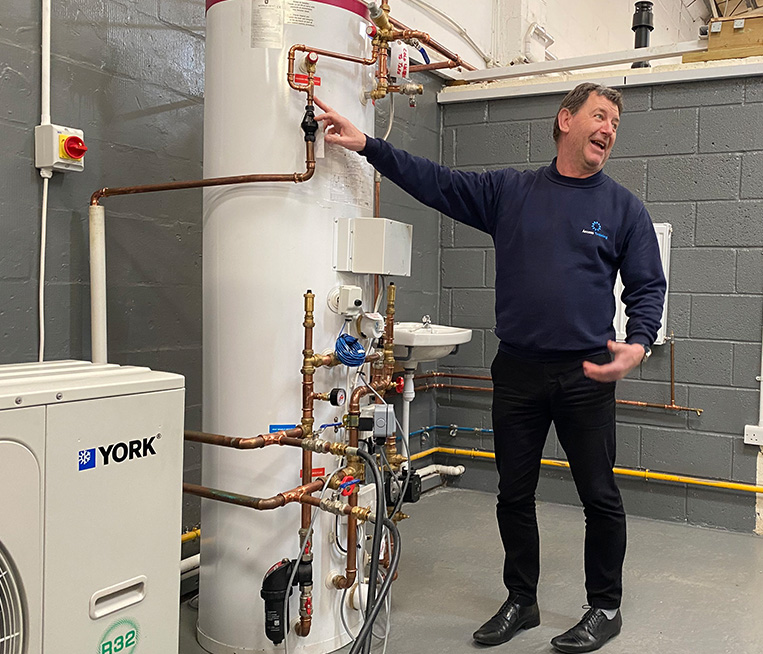




Who is this heat pump installation course suitable for?
Access Training’s heat pump installation course is designed for experienced plumbers and gas engineers. If you fall into either of the below categories, our heat pump course is perfect for you:
We have developed a number of bespoke heat pump training packages that are designed to equip installers with the skills and knowledge needed to correctly install heat pumps.

Heat Pump Qualifications for Plumbers
If you already have a Level 2 NVQ in plumbing, our heat pump course will include the following qualifications:


Level 3 Award in the Installation and Maintenance of Heat Pump Systems
- Core unit in Heat Pump Technology (Non-Refrigerant Circuit)
- Air Source unit in Heat Pump Technology (Non-Refrigerant Circuit)
Level 3 Award in Low Temperature Heating and Hot Water Systems in Dwellings
- Low Temperature Heating System
Level 3 Award in Energy Efficiency for Gas Fired and Oil Fired Domestic Heating and Hot Water Systems
- Energy efficiency for gas fired and oil fired domestic heating and hot water systems
Heat Pump Qualifications for Gas Engineers
If you’ve got the ACS qualification and you’re on the Gas Safe Register, our heat pump course will include the following qualifications:


Unvented G3 Certificate
- Unvented hot water systems and their operating principles
- Design and installation of unvented hot water storage systems
- Maintenance of unvented hot water storage systems
- Meeting the requirements of the Building Regulations
- Sealed central heating systems
WRAS Certificate of Competence
- Introduction, background and legislation
- Materials and substances in contact with water
- Water system design
- Cross connections
- Cold and hot water services
- The Water Regulations
- Requirements for water fittings
- Installation commissioning
- Backflow prevention
Level 3 Award in the Installation and Maintenance of Heat Pump Systems
- Core unit in Heat Pump Technology (Non-Refrigerant Circuit)
- Air Source unit in Heat Pump Technology (Non-Refrigerant Circuit)
Level 3 Award in Low Temperature Heating and Hot Water Systems in Dwellings
- Low Temperature Heating System
Level 3 Award in Energy Efficiency for Gas Fired and Oil Fired Domestic Heating and Hot Water Systems
- Energy efficiency for gas fired and oil fired domestic heating and hot water systems

Access Training Reviews
More Gas Engineering Courses
Heat Pump Installation Training Course FAQs
How do I become a heat pump engineer UK?
To become a heat pump engineer in the UK, you will need to achieve the necessary qualifications. Before you begin your heat pump installation training, you will need to have a background in either plumbing (Level 2 NVQ in plumbing) or gas engineering (ACS qualification and gas safe registered). Once you have achieved these qualifications, you can go on to train to become a heat pump installer by completing a heat pump engineering course, like those offered by Access Training.
How long is a heat pump installation course?
The time required to become fully qualified in heat pump installation can depend on a number of different factors, including your previous experience, qualifications, and the type of training course you opt for.
Here at Access Training, we offer a range of flexible training options so you can get qualified at your own pace. Whether you want to get qualified as soon as possible or study part time as you work, we can make your heat pump installation training work for you. Reach out and contact our course advisors to discuss your options further.
Here at Access Training, we offer a range of flexible training options so you can get qualified at your own pace. Whether you want to get qualified as soon as possible or study part time as you work, we can make your heat pump installation training work for you. Reach out and contact our course advisors to discuss your options further.
Can anyone install a heat pump?
No, only a qualified heat pump technician can install a heat pump. While it is possible for any individual to set up / mount the unit itself, a heat pump engineer is required for the connection of the heat pump parts, and it’s widely recommended that you utilise professional services for all steps of heat pump installation to ensure successful installation, and reduce risk of damage to the unit or personal injury.